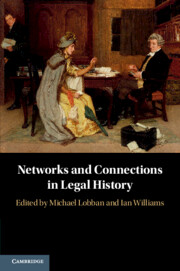Book contents
- Networks and Connections in Legal History
- Networks and Connections in Legal History
- Copyright page
- Contents
- Contributors
- 1 Introduction
- 2 Networks and Influences
- 3 Men of Law and Legal Networks in Aberdeen, Principally in 1600–1650
- 4 Calling Time at the Bar
- 5 The Thistle, the Rose, and the Palm
- 6 ‘The Bengal Boiler’
- 7 The White Ensign on Land
- 8 A Broker’s Advice
- 9 Trans-Atlantic Connections
- 10 Interpretatio ex aequo et bono
- 11 Shakespeare and the European ius commune
- 12 Law Reporting and Law-Making
- 13 John Taylor Coleridge and English Criminal Law
- Index
10 - Interpretatio ex aequo et bono
The Emergence of Equitable Interpretation in European Legal Scholarship
Published online by Cambridge University Press: 10 August 2020
- Networks and Connections in Legal History
- Networks and Connections in Legal History
- Copyright page
- Contents
- Contributors
- 1 Introduction
- 2 Networks and Influences
- 3 Men of Law and Legal Networks in Aberdeen, Principally in 1600–1650
- 4 Calling Time at the Bar
- 5 The Thistle, the Rose, and the Palm
- 6 ‘The Bengal Boiler’
- 7 The White Ensign on Land
- 8 A Broker’s Advice
- 9 Trans-Atlantic Connections
- 10 Interpretatio ex aequo et bono
- 11 Shakespeare and the European ius commune
- 12 Law Reporting and Law-Making
- 13 John Taylor Coleridge and English Criminal Law
- Index
Summary
The concept of equity is often assimilated with that of Aristotelian epieikeia, a process that corrects rules when their application to a certain case would be unjust or contrary to the intention of the legislator. In the middle ages - while theologians had written at length on the concept of epieikeia - glossators, commentators, and canonists adopted a concept of aequitas completely unrelated to it. This barrier between law and theology lasted throughout the medieval period. By the mid-sixteenth century the concept of epieikeia had become familiar to legal writers and, through the work of humanist jurists, was explicitly associated with aequitas. The introduction of epieikeia in legal scholarship opened the door to the influence of scholastic theology over the concept of equity, as lawyers and theologians worked together to build a novel concept of aequitas/epieikeia as judicial power to interpret law beyond its letter.
- Type
- Chapter
- Information
- Networks and Connections in Legal History , pp. 233 - 261Publisher: Cambridge University PressPrint publication year: 2020

